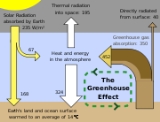isaacnewbie
I think that a lot of the anxiety about global warming comes from the broad definition of the greenhouse effect. A greenhouse becomes hotter than it's surroundings because the glass the greenhouse is made of reflects infrared radiation. The glass lets in light which is converted into heat by the soil or plants in the greenhouse and the heat can't radiate out because it's reflected by the glass. Greenhouse gases on the other hand do not reflect light they just absorb IR and then radiate it.
Let's consider water vapor. If water vapor acted like glass the world's oceans would evaporate and the world would keep heating up. Why? If water vapor acted like glass then the more water evaporated the more heat would be blocked from escaping with the result that still more water would evaporate. The result would be a reinforcing cycle in which the earth would keep getting hotter as more and more water evaporated and more and more water would evaporate as the earth became hotter.
What would happen to areas of the earth that are irrigated? If water acted like glass those areas would become hotter. The truth is the opposite. Areas of the world that are irrigated actually become cooler. Dr. Celine Bonfils and Dr. David Lobell published an article in the current (August 2013) issue of PNAS in which they discuss this cooling.
When water evaporates heat is absorbed and the earth is cooled. Eventually that water vapor should condense somewhere and release the heat so the next effect of water on heating is simply to moderate the climate.
Consider a desert which is very hot during the day and very cold at night. One would expect the presence of water to make the desert warmer at night and cooler during the day because water does not act like glass.
In addition radiation of infrared by greenhouse gases is offset by absorption of radiation. Consider a humid area as the sun rises. The light that is absorbed by clouds for example does not reach the surface and so does not heat the surface of the earth. The heating resulting from absorption of light from the water vapor is offset by the light that was blocked from reaching the earths surface.
The important thing to remember about water vapor and carbon dioxide is that for every btu of heat absorbed a btu of heat is radiated in all directions.
Let's consider water vapor. If water vapor acted like glass the world's oceans would evaporate and the world would keep heating up. Why? If water vapor acted like glass then the more water evaporated the more heat would be blocked from escaping with the result that still more water would evaporate. The result would be a reinforcing cycle in which the earth would keep getting hotter as more and more water evaporated and more and more water would evaporate as the earth became hotter.
What would happen to areas of the earth that are irrigated? If water acted like glass those areas would become hotter. The truth is the opposite. Areas of the world that are irrigated actually become cooler. Dr. Celine Bonfils and Dr. David Lobell published an article in the current (August 2013) issue of PNAS in which they discuss this cooling.
When water evaporates heat is absorbed and the earth is cooled. Eventually that water vapor should condense somewhere and release the heat so the next effect of water on heating is simply to moderate the climate.
Consider a desert which is very hot during the day and very cold at night. One would expect the presence of water to make the desert warmer at night and cooler during the day because water does not act like glass.
In addition radiation of infrared by greenhouse gases is offset by absorption of radiation. Consider a humid area as the sun rises. The light that is absorbed by clouds for example does not reach the surface and so does not heat the surface of the earth. The heating resulting from absorption of light from the water vapor is offset by the light that was blocked from reaching the earths surface.
The important thing to remember about water vapor and carbon dioxide is that for every btu of heat absorbed a btu of heat is radiated in all directions.


